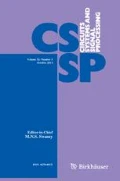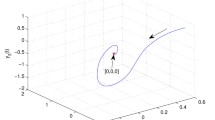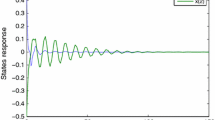Abstract
This paper deals with uncertain Lur’e differential inclusion systems with time delay. The set-valued mappings considered are upper semi-continuous, non-empty, closed, convex and bounded. It is proved that original systems can be reduced to their equivalent systems by introducing the dynamic multiplier. Based on the Lyapunov–Krasovskii functional, delay-dependent stability criterion is given to guarantee the robust absolute stability of the systems by LMI method. The result is new to the previous literature. Numerical examples are provided to show the effectiveness of the proposed stability condition.




Similar content being viewed by others
References
V. Acary, B. Brogliato, Numerical Methods for Nonsmooth Dynamical Systems, Applications in Mechanics and Electronics (Springer, Berlin, 2008)
D. Angeli, B. Ingalls, E. Sontag, Y. Wang, Uniform global asymptotic stability of differential inclusions. J. Dyn. Control Syst. 10, 391–412 (2004)
J. Aubin, A. Cellina, Differential Inclusions: Set-valued Maps and Viability Theory (Springer, New York, 1984)
S. Boyd, L. Ghaoui, E. Feron, V. Balakrishnan, Linear Matrix Inequalities in System and Control Theory (SIAM, Philadelphia, 1994)
B. Brogliato, W. Heemels, Observer design for Lur’e systems with multivalued mappings: a passivity approach. IEEE Trans. Autom. Control 54, 1996–2001 (2009)
J. Bruin, A. Doris, N. Wouw, W. Heemels, H. Nijmeijer, Control of mechanical motion systems with non-collocation of actuation and friction: A Popov criterion approach for input-to-state stability and set-valued nonlinearities. Automatica 45, 405–415 (2009)
X. Cai, J. Huang, L. Liu, Stability analysis of linear time-delay differential inclusion systems subject to input saturation. IET Control Theory Appl. 4, 2592–2602 (2010)
J. Chen, Asymptotic stability for tracking control of nonlinear uncertain dynamical systems described by differential inclusions. J. Math. Anal. Appl. 261, 369–389 (2001)
A. Doris, Output-feedback design for non-smooth mechanical systems: Control synthesis and experiments. Ph.D. thesis, Technische Universiteit Eindhoven, Eindhoven (2007)
A. Doris, A. Juloski, N. Mihajlovic, W. Heemels, N. Wouw, H. Nijmeijer, Observer designs for experimental non-smooth and discontinuous systems. IEEE Trans. Control Syst. Technol. 16, 1323–1332 (2008)
A. Fillipov, Differential Equations with Discontinuous Right-hand Side (Kluwer, Dordrecht, 1988)
K. Gu, V. Kharitonov, J. Chen, Stability of Time-delay Systems (Birkhäuser, Boston, 2003)
J. Hale, Theory of Functional Differential Equations (Springer, New York, 1977)
Q. Han, A. Xue, S. Liu, X. Yu, Robust absolute stability criteria for uncertain Lur’e systems of neutral type. Int. J. Robust Nonlinear 18, 278–295 (2008)
Y. He, M. Wu, J. She, G. Liu, Parameter-dependent Lyapunov functional for stability of time-delay systems with polytopic-type uncertainties. IEEE Trans. Autom. Control 49, 828–832 (2004)
T. Hu, Nonlinear control design for linear differential inclusions via convex hull of quadratics. Automatica 43, 685–692 (2007)
J. Huang, Z. Han, X. Cai, Note on observer for Lur’e differential inclusion systems. IET Control Theory Appl. 5, 1939–1944 (2011)
J. Huang, Z. Han, X. Cai, L. Liu, Control of time-delayed linear differential inclusions with stochastic disturbance. J. Franklin Inst. 347, 1895–1906 (2010)
J. Huang, Z. Han, X. Cai, L. Liu, Adaptive full-order and reduced-order observers for the Lur’e differential inclusion system. Commun. Nonlinear Sci. Numer. Simul. 16, 2869–2879 (2011)
B. Jayawardhana, H. Logemann, E. Ryan, Input-to-state stability of differential inclusions with applications to hysteretic and quantized feedback systems. SIAM J. Control Optim. 48, 1031–1054 (2009)
H. Khalil, Nonlinear Systems (Prentice Hall, New Jersey, 2002)
A. Kolmogorov, S. Fomin, Introductory Real Analysis (Dover, New York, 1975)
S. Lee, J. Park, Delay-dependent criteria for absolute stability of uncertain time-delayed Lur’e dynamical systems. J. Franklin Inst. 347, 146–153 (2010)
R. Leine, H. Nijmeijer, Dynamics and Bifurcations in Non-Smooth Mechanical Systems (Springer, Berlin, 2004)
X. Liu, J. Cao, On periodic solutions of neural networks via differential inclusions. Neural Netw. 22, 329–334 (2009)
A. Lur’e, Some Nonlinear Problem in the Theory of Automatic Control (H.M. Stationary Office, London, 1957)
M. Osorio, J. Moreno, Dissipative design of observers for multivalued nonlinear systems, in Proceedings of the 45th IEEE Conference on Decision and Control, San Diego (2006)
G. Smirnov, Introduction to the Theory of Differential Inclusions. Graduate Studies in Mathematics (SIAM, Philadelphia, 2002)
Acknowledgements
This work is supported by the National Natural Science Foundation of China (61074003). The authors would like to thank the Editor and the anonymous reviewers for their many helpful suggestions.
Author information
Authors and Affiliations
Corresponding author
Appendix: Proof of Lemma 1
Appendix: Proof of Lemma 1
Let \(S_{[0,T]}(\mathcal{F},x_{0})\) be the set of solutions of differential inclusion \(\dot{x}(t)\in \mathcal{F}(t,x(t))\), x(0)=x 0, and [0,T] be the interval where the solution exists.
Since ϕ(t), t∈[−τ,0] is an absolutely continuous function, the set-valued mapping \(\bar{\mathcal{F}}(t,x(t))=\mathcal{F}(x(t),\phi(t-\tau))\) is upper semi-continuous, non-empty, closed, convex and bounded, and for the differential inclusion \(\dot{x}(t)\in \bar{\mathcal{F}}(t,x(t))\), x(0)=ϕ(0) there exists a non-empty solution set \(S_{[0,T]}(\bar{\mathcal{F}},x_{0})\). Let \(\bar{x}(t)\in S_{[0,T]}(\bar{\mathcal{F}},x_{0})\), and define
Then x τ (t) is a solution of the Cauchy problem of differential inclusion \(\dot{x}(t)\in \mathcal{F}(x(t),x(t-\tau))\), t∈[0,τ] with x(t)=ϕ(t), t∈[−τ,0].
Now we estimate the norm of x τ (t). Because \(\dot{x}_{\tau}(t)\in \mathcal{F}(x_{\tau}(t),x_{\tau}(t-\tau))\) and x τ (0)=x 0=ϕ(0), it is equivalent to
then we have
Since ϕ(t), t∈[−τ,0] is absolutely continuous, there exists a constant M>0 such that \(\gamma_{2}\int_{-\tau}^{0}\Vert \phi(s)\Vert \,ds\leq M\). It follows from (48) that
By the Gronwall inequality, we have
which means that ∥x τ (t)∥ is bounded in the interval [0,τ] and independent of the selections of x τ (t) from the set \(S_{[0,\tau]}(\mathcal{F},\phi(t))\). We can continue to consider the Cauchy problem of differential inclusion \(\dot{x}(t)\in \mathcal{F}(x(t),x(t-\tau))\), t∈[τ,2τ] with x(t)=x τ (t), t∈[0,τ] for a fixed x τ (t). Using a similar procedure, a set of solutions which are defined in the interval of [τ,2τ] can be obtained. Moreover, if the solution is denoted by x 2τ (t), then x 2τ (t) is bounded and independent of the selection x 2τ (t) from the solution set. Thus the solution exists in the interval [0,2τ]. This procedure can be repeated, it means that the solution can be extended to the interval [0,∞). We complete the proof.
Rights and permissions
About this article
Cite this article
Huang, J., Yang, Y., Han, Z. et al. Robust Absolute Stability Criterion for Uncertain Lur’e Differential Inclusion Systems with Time Delay. Circuits Syst Signal Process 31, 2001–2017 (2012). https://doi.org/10.1007/s00034-012-9430-1
Received:
Revised:
Published:
Issue Date:
DOI: https://doi.org/10.1007/s00034-012-9430-1




